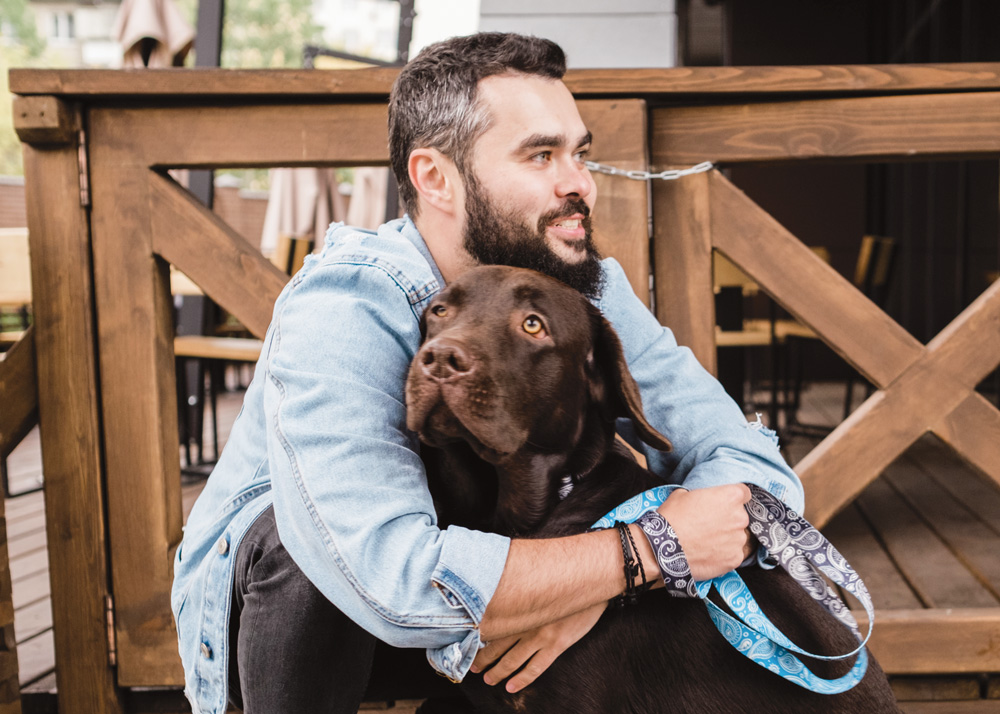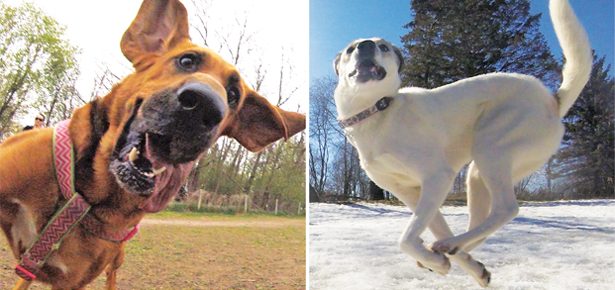

Why We Love Dogs
It’s genetic: new research shows our love (or distaste) for dogs is encoded in our DNA
I have a friend, Barbara, who has been involved with dogs—as a breeder and a competitor in conformation and dog obedience trials—all of her life. Her parents were also very much involved in dog breeding and competition, and her daughter, Cindy, too, is active in the dog world. Compare this to my colleague, Paul, who has never had a dog, nor has ever had any desire to have one. Paul's parents also never had a dog. His son, Derek, who is now married and in his mid-twenties, also does not have a dog and has no wish for one in the future.
As a psychologist I have always been interested in which factors determine certain patterns of behaviour, especially when those patterns seem to be passed on to subsequent generations in the same family. When it comes to positive or negative feelings toward dogs and dog ownership, I had always presumed that this was determined partly by cultural influences and partly by personal history.
Image: Krakenimages.com/bigstock.com
When examining cultural influence, we see that certain religions (such as Islam) have sects which teach that dogs are unclean and for them the idea of a dog as a pet is abhorrent; other religions (such as Zoroastrianism) maintain that the dog is an especially benevolent and virtuous creature which must be lovingly taken care of. Then we have personal history and its influence on our affection for dogs, which has been demonstrated by research showing that exposure to dogs during childhood is associated with more positive attitudes towards dogs and an increased likelihood of dog ownership in adulthood.
A group of scientists, however, wondered if there was a third possible factor—what if our love (or distaste) for dogs is genetically encoded in our DNA?
“Dog owners tended to be more extroverted and generally more sociable and agreeable than cat owners or those without pets.”
A team of Swedish researchers headed by Tove Fall, a Professor of Molecular Epidemiology at the Department of Medical Sciences and the Science for Life Laboratory at Uppsala University, was aware of data which showed that certain personality characteristics were more common in dog owners than in cat owners or those without pets. For example, dog owners tended to be more extroverted and generally more sociable and agreeable. Since there is already a lot of evidence which shows there are genetic influences on these and other personality characteristics, a natural next step was to wonder if there might be a genetic factor that plays a role in determining whether a person will be attracted to dogs.
This research group had some incredibly useful tools which allowed them to study this question. First they had access to the Swedish Twin Registry which was founded in the late 1950s and contains information on all twins born in Sweden. Secondly, information on Swedish dog ownership has been available since January 1, 2001 when two dog registries were established, one at the Swedish Board of Agriculture and the other at the Swedish Kennel Club. Furthermore, there is a legal requirement that all dogs in Sweden must be registered.
Image: pressmaster/bigstock.com
The reason why the twin registry was so important is because the most powerful way to determine if a particular factor is influenced by genetics is to use twins. There are two types of twins, identical and fraternal. Identical twins arise when a single fertilized egg splits to form two separate zygotes. The magic of this for scientists is that these two individuals, since they come from the same sperm and egg cell, have an identical genetic makeup—the same sex and appearance, as well as every other genetically determined characteristic.
Contrast identical twins to fraternal twins. Fraternal twins come about when two egg cells are released at the same time and these are fertilized by two different sperm cells. Once again we have two individuals growing in the same womb, however in this case they share only the same amount of genetic material that any pair of brothers or sisters might.
They might not look the same, and might not even be the same sex.
Regardless of whether we are dealing with identical or fraternal twins, both types of twins usually have very similar personal histories since they almost always grow up in the same family and share the same environment, culture, and parenting influences.
Image: twinsterphoto/bisgtock.com
Now the trick is to compare the similarities in the behaviours between the members of each type of twin pair. If we find greater similarities between the members of identical twin pairs (with their matching genetic makeup), than between members of fraternal twin pairs (who only share about half of their genes), this would confirm that we are looking at something which has a genetic component.
These Swedish researchers looked at 35,035 pairs of twins, and recorded whether they were identical or fraternal and then determined whether each of the twins had gone on to become dog owners. If there is a genetic factor then the concordance rate should be higher for the identical twins. Concordance would be shown when both twins owned dogs, or both twins did not own dogs; a lack of concordance would be shown when one twin owned a dog and the other did not. An analysis of their results showed that identical twins had higher concordance rates (meaning a similar preference for dogs) than did fraternal twins, indicating that genetics is playing a role in the love for or lack of affection for dogs.
Statistical analysis allowed the researchers to estimate just how much of an influence genetics played—and it was not slight. The inherited component influencing whether we are genetically impelled to own a dog or not is 57 percent for females and 51 percent for males. In other words, approximately half of the desire we feel to have a dog—or not—is influenced by our DNA. The other half is influenced by environmental factors, such as our personal histories or culture.
Image: vitaliymateha/bigstock.com
Though it may seem revelatory that our attitudes toward a specific animal species could have a genetic component, there are other examples. Among humans there is an overwhelmingly negative and fearful response to spiders and snakes, which is clearly genetically determined.
While this kind of twin study can't tell us exactly which genes are involved, it does demonstrate for the first time that genetics and environment play about equal roles in determining our affection for dogs and our desire to own one. The lead author Tove Fall commented, “We were surprised to see that a person's genetic makeup appears to be a significant influence in whether they own a dog.” She then went on to suggest that some genetically determined personality factors (such as agreeableness or introversion versus extroversion) might underlie this.
These are the kinds of results that can set a scientific mind off on rounds of speculation. For me it raised question as to whether, in the dim past, there was some genetic mutation in the evolution of our ancestral Homo sapiens that caused many of us to love dogs while Neanderthals lacked these genes. Most genes that are passed on in a species are those that aid in its survival (like our fear of snakes). Since Neanderthals are now extinct and Homo sapiens thrive, could it be the case that our affection for dogs is important enough for our survival as a species to be encoded in our DNA? Just speculation of course…
Join the newsletter and never miss out on dog content again!
"*" indicates required fields
By clicking the arrow, you agree to our web Terms of Use and Privacy & Cookie Policy. Easy unsubscribe links are provided in every email.









